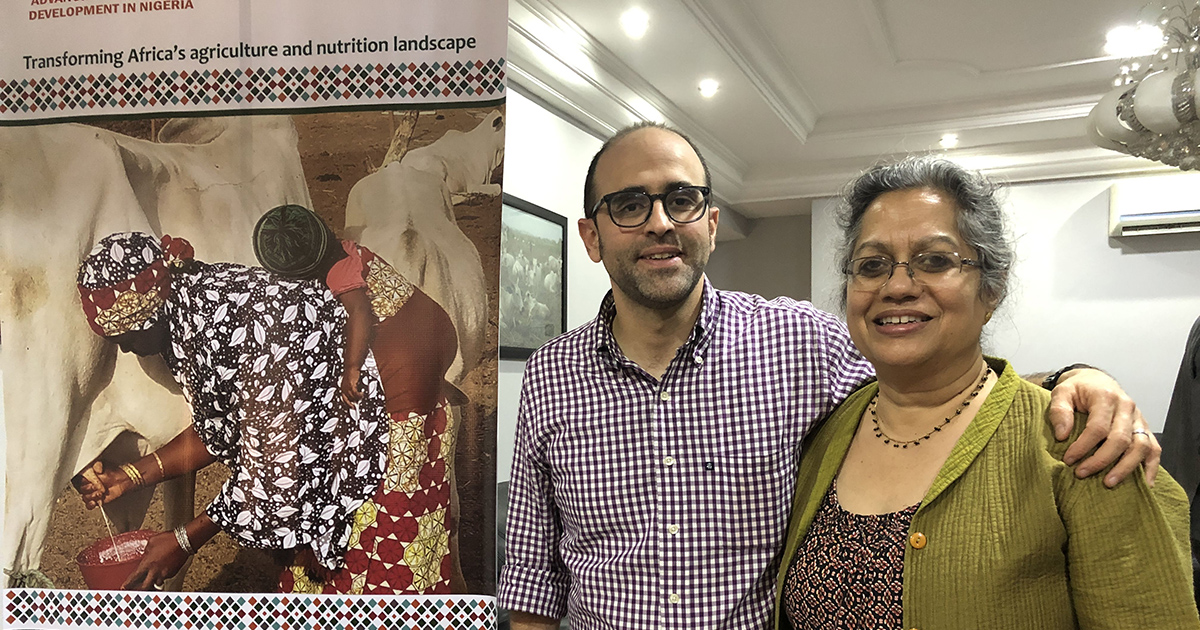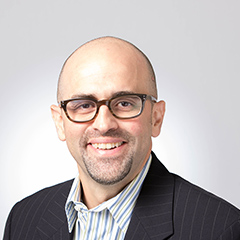Like many first-generation U.S. citizens, I often feel like I grew up in two places at the same time—two places with stark differences. My appreciation for these differences, and acknowledgment of how different my life could have been had my family not come to America, have helped shape the work I do today.
Decades ago, my parents emigrated from Quito, Ecuador’s capital city, to Miami. I come from a farming family—primarily raising dairy cows to produce milk products and cultivating staple crops in the highlands outside of Quito. Between summers in Ecuador spent on the farm, big family gatherings, and just being around others who shared our life experiences, my sister and I always felt deeply connected to our family back home. We learned how essential farming is to a community and to our own family.
But things were very different in Miami. Growing up in the United States afforded us certain privileges we never took for granted—our visits to Ecuador brought that to life for us. Though I found joy spending time with the children there, I struggled with the realities facing many families stricken by poverty. I saw children begging in the streets. Some sold merchandise on dirt roads, doing what they had to do to survive. These visits deeply affected my worldview and still do.

Snapshot of the Quiñones family farm in Ecuador.
My professional development, including my position now as a researcher in Mathematica’s International Division, is anchored in a deep commitment to serving and supporting families like mine across the world. Acting, working, and advocating in the service of others “fills my bucket,” so to speak. This service includes studying and analyzing systemic policy issues that impede the advancement of underrepresented groups and marginalized people.
Before coming to Mathematica, I spent two years in AmeriCorps’ National Civilian Community Corps, traveling the United States and serving local communities. Modeled on the Civilian Conservation Corps, the National Civilian Community Corps uses teams of 8 to 15 people serving for periods lasting six weeks to three months to complete community-driven projects in the United States. Together with local leaders, we developed, tested, and implemented solutions to meet the greatest need. We built homes for families experiencing hardship. We cleaned parks; dug, maintained, and improved trails; and removed invasive, exotic species from wooded areas. We even tutored kids and filed taxes for families with low incomes for free—you name it, we did it.
This experience showed me that no matter how different our backgrounds are, we are linked as a society, and human connection plays an important role in informing policy choices. Meaningful change is often the result of combining a series of small practical actions. Current public health challenges, such as the climate crisis, underscore our interconnectedness.
The effects of global climate change will disproportionately impact families with lower incomes. Many people, like my family in Ecuador, will have to make difficult decisions as the world gets hotter and threatens community farming. Few families have the resources to migrate if their farms dry up, obtain air conditioning when the heat becomes unbearable, or repair homes destroyed by fire or hurricane. I’ve analyzed data on the impact of drought conditions in Vietnam and Thailand that shows people from rural households are considerably less likely to migrate, particularly families on farms without irrigation and families with limited income. We found that the most vulnerable people are often trapped by their circumstances.
In a separate working paper, I show that agricultural households in Mexico that experience catastrophic crop losses due to extreme heat spells—or simply observe the heat-induced losses of members of their rural communities—are more likely to migrate. Women, whose livelihoods are less directly tied to working the farmland, are especially likely to migrate, often opting for domestic journeys that are less risky and easier to finance than international migration.
Climate change will affect all our lives in some way, but it is the most vulnerable communities who have the most to lose, and who will need the most help. In the United States, for example, extreme heat will claim nearly 60,000 lives a year by 2050; we could lose, on average, approximately $100 billion annually from heat-induced work disruptions. Because they tend to work and live in more heat-exposed regions of the country, Black and Hispanic communities face a loss of proportional productivity that will exceed the losses of their White counterparts by 18 percent.
In Mexico, Vietnam, and Thailand, interventions such as improved irrigation, access to social safety nets, and local partnerships can reduce the impacts of climate change. On the other hand, in the United States, simple actions like eating less meat, planting trees and protecting forests, reducing fossil fuel consumption, and expanding access to renewable energy could mitigate the effects of extreme heat. In many cases, the responsibility to spark change falls on community leaders. Through my research and my time with AmeriCorps, I’ve learned that local decision making is key to driving real solutions, and that shared responsibility and evidence-driven decision making is our only path forward.
As part of a new Climate Change and Health Analytics initiative, Mathematica has developed an interactive tool for exploring the impact of heat waves on health at the national, state, and local levels. Learn more about ClimaWATCH.
Working at Mathematica gives me the chance to put these ideas into action. I work with teams of researchers and policy experts who value community involvement in all we do. Though it’s not always easy, members of the research community must recognize our privilege, positionality, and limitations. We seek to engage and learn from those whose outcomes we aim to study and improve. Mitigating the challenges of climate change will require blending community voices and input with quantitative tools provided by organizations like Mathematica. I hope some of my time at Mathematica can be spent drawing back the curtain to show what’s possible when we work collectively toward common goals.
Frankly, I didn’t always plan to work on issues related to agricultural resiliency, migration, and climate change. We often don’t know exactly what we want to do early in life, and that’s okay. Sometimes we take meandering paths, explore different options, meet new people. Each life experience has given me knowledge, skills, insight, and a deeper connection to the larger fabric of society. Together, those experiences have led me to rewarding, timely, important work that fills my bucket to the brim.



